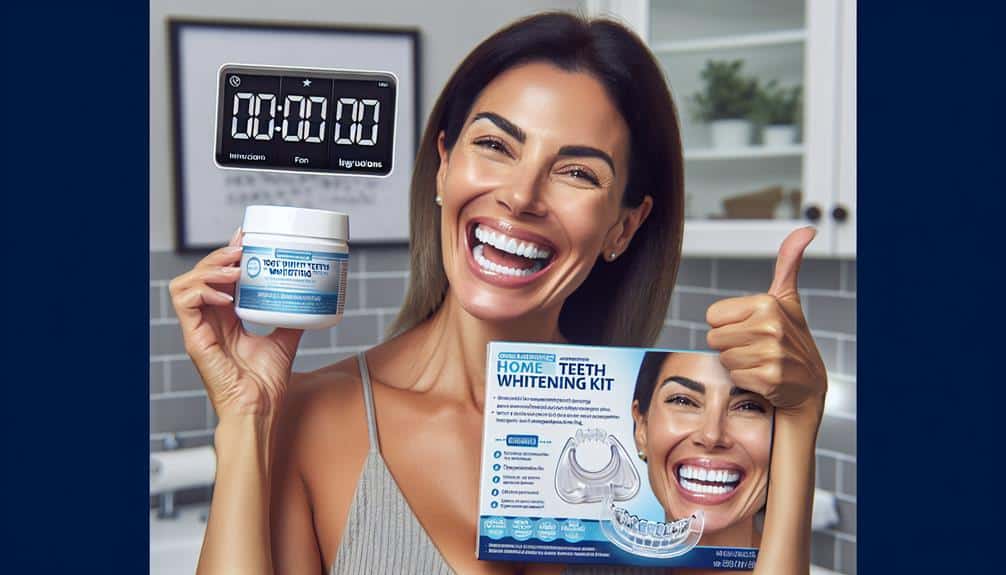Some home teeth whitening kits cause sensitivity because they contain ingredients like hydrogen peroxide, chlorine dioxide, carbamide peroxide, and acids that can harm enamel and increase sensitivity. To avoid these issues, prioritize products with balanced pH levels, enamel-safe formulations, correct application methods, and recommended duration limits. If you're looking to understand more about why certain ingredients in whitening kits contribute to tooth sensitivity, continue exploring factors such as proper oral care and product selection.
Key Points
- High concentrations of hydrogen peroxide in kits can erode enamel, leading to sensitivity.
- Chlorine dioxide in some kits can damage enamel, increasing tooth sensitivity.
- Carbamide peroxide found in whitening kits can weaken enamel over time.
- Acids present in whitening products can erode enamel, causing sensitivity.
- Awareness of harmful chemicals in whitening kits is crucial to prevent sensitivity.
Common Causes of Teeth Sensitivity
Do you know what common causes can lead to teeth sensitivity? Teeth sensitivity is often a result of worn tooth enamel or exposed tooth roots. One common cause is improper brushing techniques, which can lead to enamel erosion and gum recession, exposing the sensitive inner layers of the teeth. It's important to maintain proper brushing habits to prevent these issues. Regular dental checkups play a significant role in identifying early signs of enamel wear or gum recession, allowing for timely intervention to prevent sensitivity.
Inadequate oral hygiene practices can also contribute to teeth sensitivity. Plaque buildup, if not removed promptly through proper brushing and flossing, can lead to tooth decay and gum disease, both of which can cause sensitivity. Additionally, certain acidic foods and beverages can erode tooth enamel over time, making teeth more prone to sensitivity.
To maintain good oral health and prevent teeth sensitivity, it's essential to follow a proper oral hygiene routine, attend regular dental checkups, and be mindful of dietary choices that may impact dental health.
Ingredients to Avoid in Whitening Kits
Avoid purchasing home teeth whitening kits that contain certain ingredients known to cause sensitivity and damage to your teeth. Some harmful chemicals can lead to enamel damage and increased tooth sensitivity. When choosing a whitening kit, it's important to be aware of what ingredients to avoid to protect your oral health.
Here are some harmful substances commonly found in whitening products:
- Hydrogen Peroxide: While effective in whitening, high concentrations of hydrogen peroxide can lead to enamel erosion and tooth sensitivity.
- Chlorine Dioxide: This bleaching agent is known to cause damage to the enamel, making teeth more prone to sensitivity and decay.
- Carbamide Peroxide: Similar to hydrogen peroxide, carbamide peroxide can weaken enamel over time, leading to increased sensitivity.
- Acids: Citric acid or other acidic components in whitening kits can erode enamel, causing long-term damage and sensitivity issues.
Tips for Choosing Gentle Whitening Products
Considering your oral health, what key factors should you prioritize when selecting gentle teeth whitening products?
To guarantee a gentle whitening experience, focus on products with balanced pH levels to safeguard enamel health. Opt for whitening kits that are formulated to be enamel-safe, minimizing the risk of sensitivity.
When choosing a product, pay attention to application techniques. Gentle whitening products often come with clear instructions on how to apply them correctly to prevent irritation.
Additionally, follow recommended duration limits for product usage. Overusing whitening products can lead to enamel damage and increased sensitivity. By adhering to specified timeframes, you can achieve a brighter smile without compromising your oral health.
Prioritizing these factors will help you select gentle teeth whitening products that effectively whiten your teeth while safeguarding your enamel and minimizing sensitivity risks.
Best Practices for Sensitive Teeth
For those with sensitive teeth, incorporating important oral care practices can help alleviate discomfort and maintain overall oral health. When managing sensitivity, it's essential to take into account toothpaste options designed specifically for sensitive teeth. These toothpaste formulas typically contain ingredients like potassium nitrate or arginine, which help desensitize nerve endings in the teeth.
Additionally, professional treatments provided by your dentist can offer long-lasting relief from sensitivity by addressing underlying issues such as enamel erosion or gum recession. Regular dental care, including professional cleanings and check-ups, is vital for identifying and addressing sensitivity early on.
Natural Alternatives to Traditional Whitening
To explore natural alternatives to traditional whitening methods, you can consider incorporating gentle yet effective remedies that promote a brighter smile without compromising tooth sensitivity. Herbal remedies like baking soda, activated charcoal, and hydrogen peroxide are popular options for at-home teeth whitening. Baking soda, when mixed with water to form a paste, can help remove surface stains gently. Activated charcoal, known for its adsorption properties, can bind to compounds that cause discoloration on the teeth. Hydrogen peroxide, in diluted concentrations, can act as a bleaching agent to lighten stains.
DIY options such as oil pulling with coconut oil or using a mixture of lemon juice and baking soda can also aid in teeth whitening. These holistic approaches aim to whiten teeth using organic solutions that are less likely to cause sensitivity. Remember that while natural remedies can be effective, caution is necessary and consulting with a dental professional if you have any concerns about their impact on your oral health is important.
Frequently Asked Questions
Can Genetics Play a Role in How Sensitive Someone's Teeth Are to Whitening Treatments?
Genetic factors can influence how sensitive your teeth are to whitening treatments. Enamel strength, determined partly by genetics, plays a role in protecting teeth from sensitivity. Understanding your genetic predispositions can help mitigate any potential issues.
Are There Any Long-Term Effects on Tooth Sensitivity From Using Home Whitening Kits?
Feeling some sensitivity after using home whitening kits? Take heart! You can prevent long-term effects by using desensitizing toothpaste or spacing out treatments. Alternative treatments like professional whitening may also be gentler on your teeth.
How Can Someone Determine if Their Teeth Are Too Sensitive for Whitening Treatments?
To determine if your teeth are too sensitive for whitening, perform a sensitivity test. Protect tooth enamel by using desensitizing toothpaste prior. Seek professional advice for personalized sensitivity prevention strategies.
Are There Any Specific Dental Conditions That Can Increase the Risk of Sensitivity When Using Whitening Kits?
When using whitening kits, specific dental conditions like gum disease, enamel erosion, or exposed dentin can increase sensitivity risk. Understanding your oral health and consulting a dentist can help minimize discomfort during whitening treatments.
Can Overusing Whitening Products Contribute to Increased Sensitivity in Teeth?
Overusing whitening products can indeed increase teeth sensitivity. To manage sensitivity effectively, consider reducing whitening frequency. This approach helps maintain a balance between achieving a brighter smile and safeguarding your dental health.



